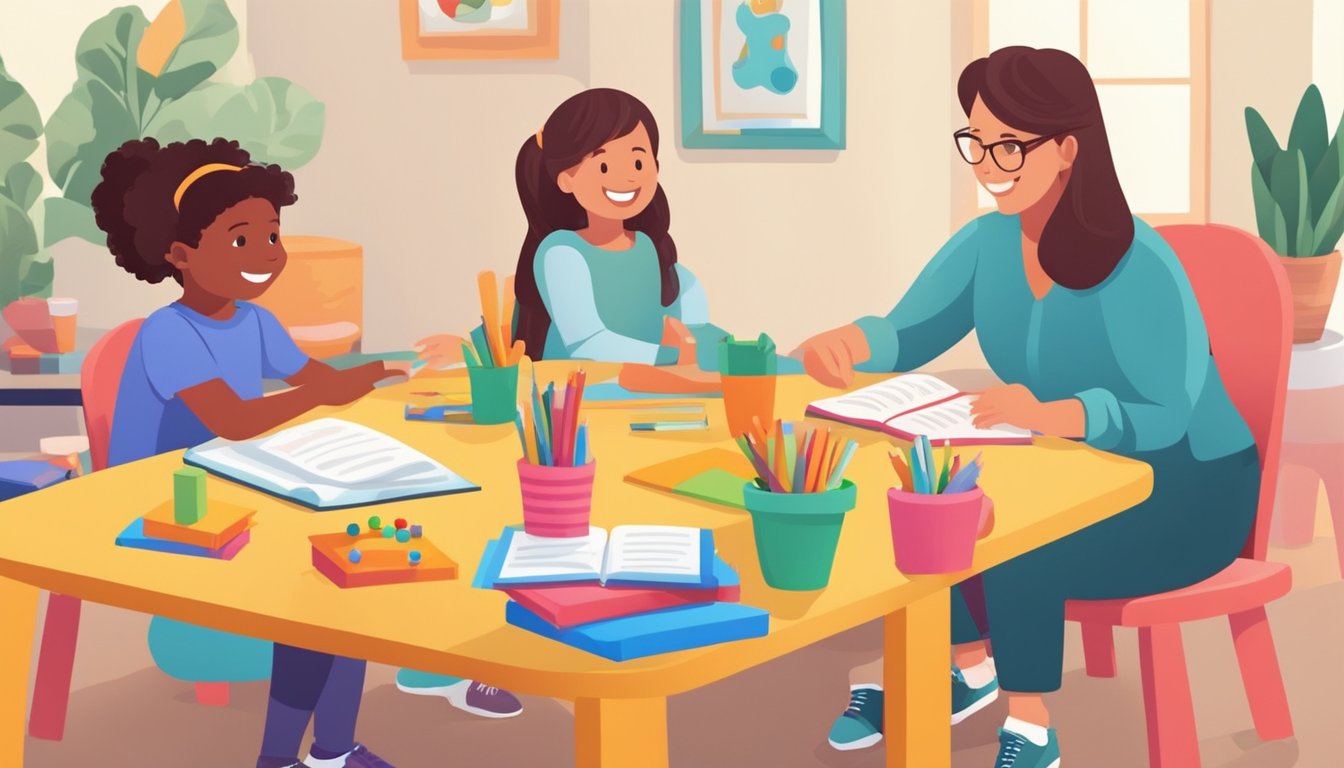100+ Preschool Interview Questions: Key Topics to prepare

As a candidate preparing for a preschool teaching job interview, it is essential to understand the significance of thorough preparation and familiarity with key topics that may be addressed during the interview process.
Being well-prepared not only demonstrates professionalism but also showcases a genuine commitment to providing high-quality early childhood education.
This post covering 100+ questions to prepare for the preschool interview aims to provide insights into the key topics that candidates should focus on, including teaching philosophy, classroom management, child development knowledge, and interpersonal skills.

By understanding and addressing these key areas, candidates can effectively convey their passion for early childhood education and their ability to create a nurturing and stimulating learning environment for young children.
Page Contents
Understanding the Preschool Interview
When preparing for a preschool interview, focusing on the teacher’s role, essential skills, and the importance of early education sets the foundation for effective dialogue.
The Role of the Preschool Teacher
In a preschool interview, you’ll be asked about your understanding of a teacher’s role in early childhood education. Preschool teachers are pivotal in fostering a child’s social and intellectual development. Expect questions regarding:
- Curriculum development and implementation
- Classroom management
- Student engagement techniques
- Parent-teacher communication
Key Skills and Qualifications for Preschool Interview
Qualifications typically include a degree in early childhood education or a related field. Certification in childcare may also be required. Skills often assessed during a preschool teacher interview include:
- Patience and creativity
- Strong communication and organizational skills
- Ability to work collaboratively with staff and parents
| Core Skills | Description |
|---|---|
| Classroom Management | Creating an orderly learning environment |
| Lesson Planning | Developing age-appropriate educational activities |
| Observation | Assessing student progress and needs |
| Communication | Clearly conveying information to students and parents |
The Significance of Early Education
You may be asked to discuss why early education is crucial. High-quality preschool programs have been shown to improve children’s cognitive and social abilities. Detail your commitment to:
- Creating inclusive learning experiences
- Encouraging a child’s natural curiosity
- Laying the groundwork for lifelong learning
During the interview, demonstrating a solid grasp of these concepts will showcase your preparation and passion for educating young learners.

When preparing for a preschool interview, it’s essential to have ready answers to questions about experience:
Q1: How many years of experience do you have working in early childhood education?
A1: You might respond with the exact number of years you’ve been involved in early childhood education, detailing any specific roles you’ve held.
Q2: Can you describe your previous work environment and how it has prepared you for a preschool setting?
A2: You should outline the characteristics of your previous work settings and how these experiences have equipped you for the current preschool position.
Q3: What age groups have you worked with, and do you have a preference?
A3: You’d specify the age ranges you’ve interacted with in your career and if you have a preferred age group to work with, explaining why.
Q4: What type of curriculum or educational philosophies have you engaged with in your teaching?
A4: You’d describe the curricula or educational philosophies you have experience with, such as Montessori, Reggio Emilia, or traditional, etc.
Q5: Can you share an example of a successful project or activity you implemented in a previous class?
A5: You’d detail a specific project or activity, explaining the objectives, your approach, and the outcomes.
Q6: Have you managed a classroom with children who have special needs?
A6: You should discuss any relevant experiences teaching or managing classrooms inclusive of children with special needs.
Q7: How have you handled challenging behavior in the classroom in past roles?
A7: You’d provide a clear example of how you approached a behavioral challenge, outlining the strategies you employed.
Q8: Can you talk about any experience you have with parent-teacher communication?
A8: You’d outline your methods and experience in engaging and communicating with parents about their children’s progress.
Q9: Have you had experience with remote or digital learning tools in a preschool setting?
A9: You’d discuss your familiarity and engagement with any digital platforms or remote teaching methods.
Q10: Can you give an example of how you’ve continued your professional development in early childhood education?
A10: You’d explain any additional training, certifications, or workshops you’ve attended to further your skills in the field.
List of 100 Sample Preschool Interview Questions
- What motivated you to pursue a career in early childhood education?
- Can you describe your teaching philosophy?
- How do you create a positive and inclusive classroom environment?
- What experience do you have working with preschool-aged children?
- How do you plan and implement age-appropriate curriculum and activities?
- Can you describe a typical day in your preschool classroom?
- How do you promote social-emotional development among young children?
- Can you provide examples of how you incorporate play-based learning into your teaching practices?
- How do you differentiate instruction to meet the diverse needs of children in your classroom?
- What strategies do you use to manage behavior and create a respectful learning environment?
- How do you communicate with parents and caregivers about their child’s progress and development?
- Can you discuss your experience with assessing and documenting children’s learning and growth?
- How do you support children’s language and literacy development?
- Can you describe your approach to teaching math concepts to preschoolers?
- How do you incorporate science and exploration into your curriculum?
- What experience do you have with arts and creative expression in the preschool classroom?
- How do you integrate technology into early childhood education?
- Can you discuss your approach to fostering independence and self-help skills in young children?
- How do you promote diversity and multiculturalism in your classroom?
- What strategies do you use to create a safe and healthy learning environment?
- Can you describe your approach to supporting children with special needs or learning differences?
- How do you facilitate parent involvement and engagement in your preschool program?
- Can you provide examples of how you address transitions and routines in your classroom?
- How do you handle conflicts or disagreements among preschool-aged children?
- What professional development opportunities have you pursued to enhance your skills as a preschool teacher?
- How do you collaborate with colleagues and other professionals to support children’s learning and development?
- Can you discuss your experience with planning and organizing field trips or special events for preschoolers?
- How do you ensure that children have access to nutritious meals and snacks during the day?
- Can you describe your approach to teaching social skills and peer relationships?
- How do you support children’s gross and fine motor skill development?
- What strategies do you use to engage children with diverse interests and learning styles?
- Can you discuss your experience with outdoor play and nature-based learning?
- How do you promote resilience and problem-solving skills in young children?
- Can you provide examples of how you incorporate music and movement into your curriculum?
- How do you assess children’s progress and learning outcomes?
- What role do parents play in your classroom community?
- Can you describe your experience with creating and maintaining a preschool classroom environment?
- How do you ensure that children are supervised and safe at all times?
- Can you discuss your approach to teaching emotional regulation and self-control?
- How do you handle emergencies or crisis situations in the preschool setting?
- What strategies do you use to encourage curiosity and a love of learning in preschoolers?
- Can you provide examples of how you support children’s imagination and creativity?
- How do you incorporate storytelling and literacy-rich activities into your curriculum?
- Can you discuss your experience with teaching children about health and hygiene?
- How do you promote teamwork and cooperation among preschool-aged children?
- What strategies do you use to promote positive self-esteem and confidence in young children?
- Can you describe your approach to teaching about diversity and inclusivity?
- How do you ensure that children have access to developmentally appropriate materials and resources?
- How do you promote environmental awareness and sustainability in your classroom?
- Can you discuss your experience with teaching children about safety and personal boundaries?
- How do you involve children in decision-making and problem-solving activities?
- Can you provide examples of how you incorporate social studies and community-based learning into your curriculum?
- How do you support children’s curiosity and inquiry through hands-on exploration and discovery?
- Can you discuss your approach to teaching children about emotions and empathy?
- How do you address children’s individual interests and passions in your classroom?
- Can you provide examples of how you facilitate cooperative learning and peer collaboration?
- How do you ensure that children have opportunities for both structured and unstructured play?
- Can you discuss your experience with promoting outdoor learning and nature exploration?
- How do you encourage children to take risks and embrace challenges in their learning?
- Can you describe your approach to teaching children about friendship and kindness?
- How do you incorporate reflection and self-assessment into your teaching practices?
- Can you provide examples of how you use formative assessment to guide instruction?
- How do you involve children in setting and achieving their own learning goals?
- Can you discuss your experience with teaching children about environmental stewardship and conservation?
- How do you promote a growth mindset and resilience in preschool-aged children?
- Can you describe your approach to teaching children about community service and giving back?
- How do you incorporate technology and digital literacy into your curriculum?
- Can you provide examples of how you use inquiry-based learning to engage children in their own learning process?
- How do you foster a sense of belonging and community in your classroom?
- Can you discuss your experience with teaching children about conflict resolution and problem-solving?
- How do you ensure that children have access to culturally relevant and diverse literature and resources?
- Can you describe your approach to teaching children about empathy and social justice?
- How do you promote critical thinking and problem-solving skills in preschoolers?
- Can you provide examples of how you incorporate experiential learning into your curriculum?
- How do you support children’s curiosity and wonder about the world around them?
- Can you discuss your experience with facilitating parent-teacher partnerships and communication?
- How do you involve children in the planning and implementation of classroom activities?
- Can you describe your approach to teaching children about healthy eating and nutrition?
- How do you ensure that children have access to opportunities for physical activity and movement?
- Can you provide examples of how you incorporate mindfulness and relaxation techniques into your classroom?
- How do you ensure that children have access to age-appropriate and culturally relevant books and materials?
- Can you discuss your experience with teaching children about digital citizenship and internet safety?
- How do you promote positive self-expression and creativity in young children?
- Can you describe your approach to teaching children about self-care and emotional well-being?
- How do you ensure that children have access to opportunities for artistic expression and creativity?
- Can you provide examples of how you incorporate outdoor play and exploration into your curriculum?
- How do you encourage children to take responsibility for their own learning and behavior?
- Can you discuss your experience with teaching children about environmental sustainability and conservation?
- How do you promote curiosity and inquiry through hands-on learning experiences?
- Can you describe your approach to teaching children about empathy and compassion?
- How do you foster a sense of wonder and curiosity in young children?
- Can you provide examples of how you support children’s exploration and experimentation in your classroom?
- How do you encourage children to take risks and try new things in their learning?
- How do you support children’s development of executive functioning skills such as planning, organizing, and problem-solving?
- Can you describe your approach to teaching children about emotional regulation and coping strategies?
- How do you create opportunities for children to develop their sense of identity and self-awareness?
- Can you provide examples of how you promote positive peer relationships and cooperation among children?
- How do you encourage children to express themselves creatively through various art forms and mediums?
- Can you discuss your experience with facilitating children’s exploration of different cultures, traditions, and languages?
- How do you incorporate outdoor play and nature-based learning experiences to enhance children’s overall development and learning?
To sum up, the process of interviewing candidates for preschool teaching positions is a critical step in ensuring the selection of qualified and dedicated educators who can provide a nurturing and enriching environment for young children.
By asking a comprehensive range of questions that assess teaching philosophy, classroom management techniques, child development knowledge, and interpersonal skills, preschool administrators can gain valuable insights into each candidate’s suitability for the role.
Additionally, incorporating scenario-based questions and situational inquiries can provide a glimpse into how candidates approach real-life challenges and demonstrate their problem-solving abilities.
A well-structured interview process not only helps in identifying educators with the right qualifications but also those who are passionate about early childhood education and committed to supporting the growth and development of young learners.







